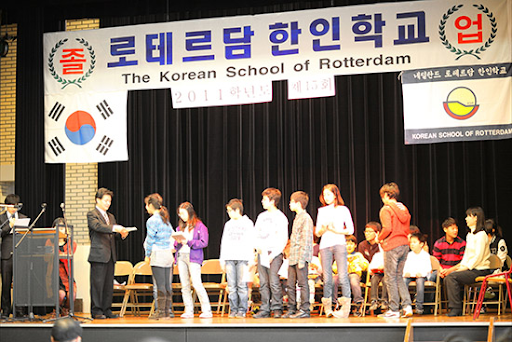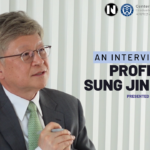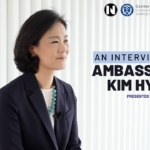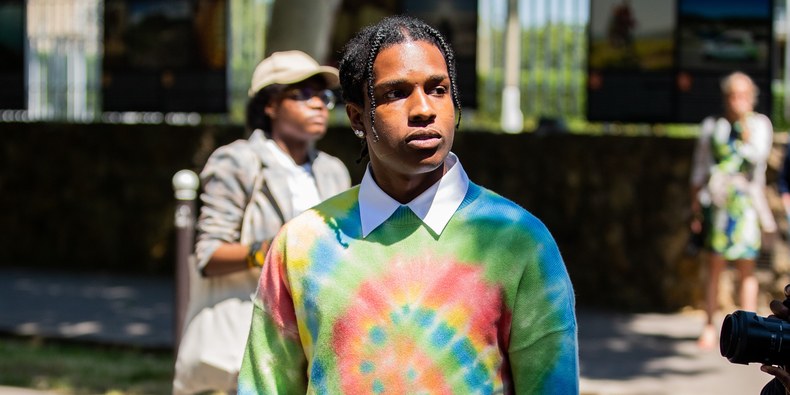The Korean school I attended in the Netherlands did not offer classes for the last year of high school. Students were expected to be in Korea studying for the sunung, the highly competitive life-determining Korean SAT. I was the only one left from my class that year since all of my friends left for the “land of our ancestors”, as we jokingly called it. Some were more reluctant than others about their return, some were jealous about my prolonged stay in the “oh so nicer Netherlands” that was juxtaposed against the “Hell Joseon” that Korea had become.
The Korean diaspora, with a size of about 7.5 million people, had a persisting narrative of return, an underlying normative assumption of re-emigration to the motherland. Talking with Korean returnees currently studying in Korea about these narratives of emigration made me want to uncover their stories of identity, lingering expectations, disappointments, and homesickness. What motivated them to come back and how is Korea treating them? How do they negotiate with their own identity and the one society imposes on them? To find out more about these struggles, I asked five overseas Koreans who are currently studying in Seoul to share their experiences with me.
Public vs Private Identity
“I identify as a Korean because I am ethnically Korean, but…” J.H., an undergrad in International Studies at Korea University explained to me how she sees herself as a 2nd generation immigrant. Born in the United States “I identify myself as an American,” she says, as she enthusiastically describes how life there was, before moving to Korea. As J.H. had almost no prior experience of Korea before, re-emigration may be a wrong label: “I didn’t feel like I was returning to Korea. In Korea, I feel at times like there is an invisible wall separating me from “true” Koreans.” She describes how some of her peers will both call her out for not being a ‘true Korean’, while simultaneously holding a stereotypical image of Americans, “They have an already fixed or formed image of Americans, so based off of this image, they expect my behaviour and thoughts to be the same.”
There were also those who described themselves as 1st or 1.5 generation overseas Korean. E.C., also a student at Korea University, considers herself to be a 1st generation overseas Korean, “since I am the first foreign born in my family.” She identifies as both Korean and South American, “but most of the time I will just say I am Korean since it is easier when I first meet people… I would rather not explain my upbringing in detail.” S.H., a fellow graduate student at Yonsei GSIS, added that “because I came with my parents, they would be the 1st generation. As their child who came with them and was not born in the new country, I would be the 1.5.” She only called herself Korean outside of Korea; in Korea she identified as a gyopo.
Gyopo is a Korean term for Koreans who have emigrated from Korea and changed their nationality to that of their new country. However, over the years, its social definition has shifted to encompass all Koreans that emigrated since the end of the Korean War, and their descendants, regardless of citizenship status. But on top of this, it is also a term that a lot of gyopos have rejected in response to the public image attached to it. As Koreans living a large number of years outside of the homeland, the South Korean public has often portrayed them as culturally disconnected, ignorant, and privileged. This is reflected in the statement from J.H.: an invisible wall between native born and overseas born Koreans. Yet more and more are returning and the government is increasingly recognising the potential of this pool of human capital.
Into the arms of the state
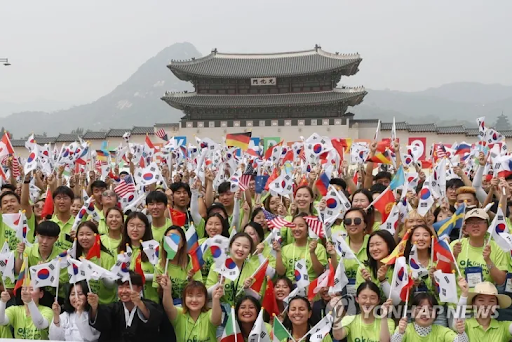
The Overseas Korean Foundation organises yearly ‘motherland tours’ for descendants of overseas Koreans. | Source: Yonhap News
On March 2nd 2023, the South Korean government passed legislation to promote the Overseas Korea Foundation to an Agency to better support the 7.5 million residing outside of the Korean peninsula. Having bipartisan support – something not necessarily easily achieved in the volatile Korean democracy – politicians and the public seem to be understanding of the large diaspora and their need for support from the motherland; however, there is an ulterior motive at play. The rapid decline in birth rate has spurred the government to look for alternative sources of labour and the large diaspora has come under the attention of the Ministry of Justice. Currently, the Korean nationality law only permits dual citizenship for seniors over the age of 65, to allow for seniors to return to Korea to enjoy their retirement. The Minister is looking for ways to change the Nationality Law and lower the age at which dual citizenship is possible, a shift from the prevailing notions on homogeneity of the nation and the equalisation of citizenship and nationality.
But for the overseas Koreans, back in the land of their ancestors, there is little to no support available. With the prevailing ethnic nationalism in Korea, being racially Korean but ethnically foreign comes with its own difficulties. It is simply assumed that the returnees adjust and feel at home with ease; this is far from reality. “There is not only the cultural difference but also the lack of experience with life in general.” J.A. from Singapore gave a detailed account of the difficulties that come with dealing with the Korean bureaucracy, an already troublesome experience in and of itself. “They expect you to understand everything simply because you are Korean in their eyes. Then when you do not, they judge you. Or at least, that is what it feels like.”
Korean Citizenship = Korean Nationality (?)
Citizenship and nationality are strongly tied together in the modern nation state and South Korea is no exception; however, a strongly racialised form of ethnic nationalism that has historically formed the basis for citizenship law strongly resonates into the present. The foundation for this can be traced back to the Ilgukilmin ideology of South Korea’s first president-dictator Rhee Syngman: a single people means a single bloodline, if not for the same bloodline and lineage, conceiving a single nation is impossible. Ironically, although Rhee Syngman himself was a first generation immigrant to the United States where he also spent his final days, he failed to recognise the innate Korean multiculturalism that was present through the diaspora. Instead, an ideology of exclusivity and superiority became the foundation of the new South Korean identity that was to be formed against the North Korean communists.
Not only does the contemporary multiculturalisation of Korea contest this conception, but the Korean diaspora and their return is testimony of a pluralistic society. When talking to Seoul National University student H.J., the topic of the diversity among Koreans came up. Recognising that there are many diverse groups of people spread over the entire globe that refer to themselves as Korean, with some historic or ancestral ties to the area that is the Korean peninsula, “I feel like we are not necessarily part of the South Korean identity, but belong more to a broader Koreanness, one that encapsulates all Koreans.” Besides the obvious North Korean population, there are large groups of Koreans in China, the descendents from immigrants to Manchuria during the 19th century; Japan, the descendents from colonial migration streams to the imperial centre; former areas of the USSR, relocated by Stalin; Europe, mostly economic migrants and adoptees; and the entire American continent. Yet, challenging Seoul as the normative epicentre of contemporary Korean identity seems ridiculous; however, this is exactly the negotiation that non-South Korean born Koreans have between their self-identity and the standardised Koreanness that is expected of them.
To be a “Korean”
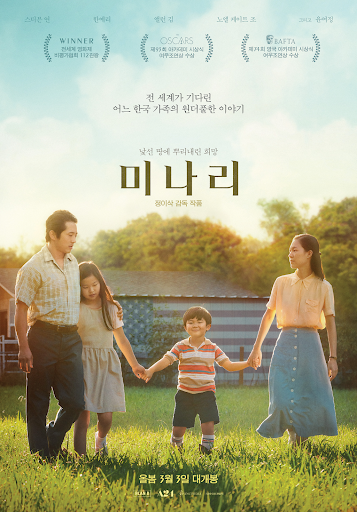
The award winning Minari is a story about the hardships of first generation Koreans settling in the United States. | Source: IMDB
With Korea seeing an increasingly multicultural population and a government recognising that it needs immigration to sustain growth for the foreseeable future, calls for a more inclusive discourse on multiculturalism have been getting stronger. This is in direct opposition to the deep-rooted ethnicism that still dominates Korean thinking. It is at the point of intersection of these parallel modes that the compounding position of returning Koreans in Korean society can be found. Reducing the returnees to one-dimensional, intrinsically Korean automatic citizens of the Republic of Korea, merely a source of social capital, not only makes the process of resettling in Korea more difficult but, above all, it ignores the complex diversity that is intrinsically present in the Korean ethos. Recognising and acknowledging this diversity may be a way to open up a new avenue for multiculturalism in an increasingly xenophobic society.
I remember visiting the movies with E.C. to watch Minari, a story about the hardships of first generation Koreans settling in the United States. We, like many other overseas Koreans, found emotional comfort in this movie. Through the lens of this movie, the commonality of the difficult experiences that our parents and us have struggled through was perfectly captured in a compelling story. The other Koreans in the theatre quickly left, even before the lights turned on, while E.C. and I remained seated in silence with tears rolling down our eyes. The deafening silence was abruptly broken by the words of one lady walking out: “I do not understand why this movie got so many awards, it is not that interesting, not really Korean.” With the end credits slowly scrolling by, the bright lights on our faces, E.C. and I were at that moment on a distant desert island, far removed from the supposed ‘real Korea’ that we had returned to.

